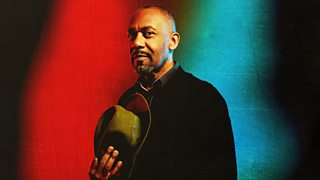Eight annoying made-up words used in everyday life
Grahame Coats, the slippery talent agent in Neil Gaiman’s Anansi Boys, does worse things to the English language than he does to his clients... almost.
Coats’s favourite word is “absatively”, a term described in the novel as “a car-crash between absolutely and positively” that sets lead character Fat Charlie’s teeth on edge.
Here we present eight made-up words used in everyday life with a similar effect. How many do you use?

Absatively strange - the language of Anansi Boys
Julian Rhind-Tutt talks about his unusual vocabulary in Neil Gaiman's Anansi Boys.
1. Nom
Not used as a time-saving abbreviation ("this year’s Oscar noms have been announced"), but as a verb ("I nommed that whole cheesecake") or exclamation ("Ice cream! Nom nom nom!") by anyone over the age of five, this is very nearly unpardonable.
Avoid if: you aren’t the Cookie Monster
Avoid if: you aren’t the Cookie Monster.
See also: All baby-talk advertising copy in the first person. It’s a mango smoothie, it doesn’t have a mummy and a daddy.

2. Misunderestimate
"Embiggen" was invented as a gag on The Simpsons.
The same can’t be said for "misunderestimate", perhaps the most famous verbal slip-up—or Bushism—made by the 43rd president of the United States George W. Bush.
Avoid if: you’re the leader of the free world. People will notice.
See also: underminded (as used by a candidate on The Apprentice 2017), refudiate (as used by former governor of Alaska Sarah Palin).

3. Chillax
Common use has made several portmanteau words so benign that hearing them barely raises the blood pressure: smog, romcom, biopic…

They know consumers are powerless against the combination of an unusual phrase and a cute animal
Hear "chillax" (a combination of "chill" and "relax") however, and an immediate course of beta-blockers is required. Ironic, really.
Avoid if: you aren’t a Teenage Mutant Ninja Turtle.
See also: bromance, webinar, Brexit.
4. Simples
Advertisers are clever so-and-sos.
They know consumers are powerless against the combination of an unusual phrase and a cute animal.
That’s why the autobiography of a fictional Russian meerkat is currently rated at a practically perfect four-and-a-half stars on the website of a popular online bookseller.
We have only ourselves to blame.
Avoid if: you don’t want people to secretly pity you.
See also: confused.com, you’re so money supermarket, it does what it says on the tin.

5. Meh
Used to convey indifference, "meh" is a practical answer to the question of how to shrug one’s shoulders in writing.
A practical answer to the question of how to shrug one’s shoulders in writing
Its practicality though, makes it no less frustrating to read online. And read. And read. And read again.
Avoid if: your soul contains even the merest hint of joy or passion.
See also: d’oh, w00t.
6. Monetise
The modern business world has done much to earn our gratitude.
Without it, we’d be missing countless technological advances and time-saving, even life-saving products.
The ugly jargon it has contributed to day-to-day language though, is hard to forgive. Monetise. Going forward. To action. To dialogue... demonic phrases all.

Avoid if: you aren’t currently in an episode of Dragon’s Den.
See also: incentivise, shift the dial, fail forward, close the circle, "flag up" meaning "draw attention to", to be "across" a subject.
you don’t want to sound as though you’re advertising a multinational fast-food chain
7. The feels
As in "Blue Planet II puffin = all the feels". That brave bird fighting her way back to her pufflings through dangers untold deserves better than lazy shorthand. If you’re unable to express the complex rush of emotions she inspires, then at least do her the honour of pronouncing the entire word "feelings". She’s earned it.
Avoid if: you don’t want your brain to gradually forget the second syllable of other words too. It’s a slippery slope.
See also: Sleeps, totes.
8. I’m loving…
What is Anansi Boys?

A new six-part adaptation of Neil Gaiman's mythical fantasy, Anansi Boys, following trickster god Anansi and his unsuspecting son Charlie. Starring Jacob Anderson, Tanya Moody and Lenny Henry.
It’s not grammatically incorrect to use the stative verb "to love" in the present continuous form ("I’m loving") rather than the present simple ("I love"), but it is really, really annoying.
Avoid if: you don’t want to sound as though you’re advertising a multinational fast-food chain.
See also: I can’t even.
Anansi Boys begins on BBC Radio 4 at 11.30pm on Christmas Day.
More Neil Gaiman on Radio 4
-
![]()
Listen to Anansi Boys
A new, six-part adaptation of Neil Gaiman's mythical fantasy about the trickster god Anansi and his unsuspecting son Charlie. Starring Jacob Anderson and Lenny Henry.
-
![]()
Lenny Henry: Why Anansi Boys is special
The actor reflects on the unusual story of how Neil Gaiman came to write Anansi Boys and the importance of the drama.
-
![]()
Listen to Good Omens
Adaptation of the 1990 fantasy novel by Neil Gaiman and Terry Pratchett. An angel and a demon try to save the world from an apocalypse. Starring Peter Serafinowicz and Mark Heap.
-
![]()
Terry Pratchett on Neil Gaiman
"We got on fine. Hard to say why, but at the bottom was a shared delight and amazement at the sheer strangeness of the universe..."




